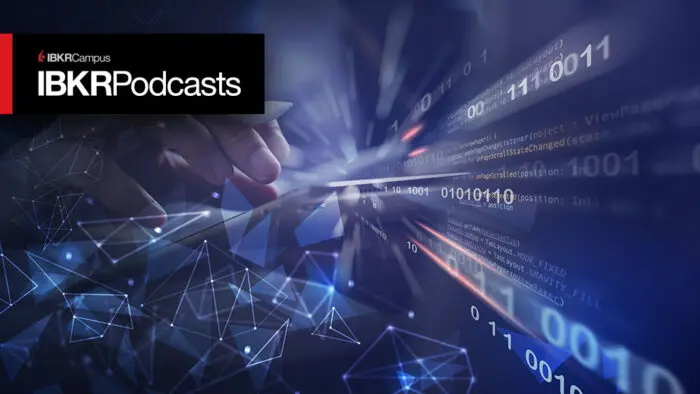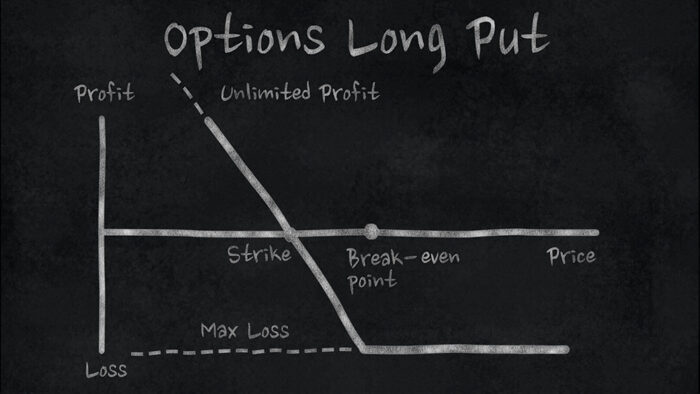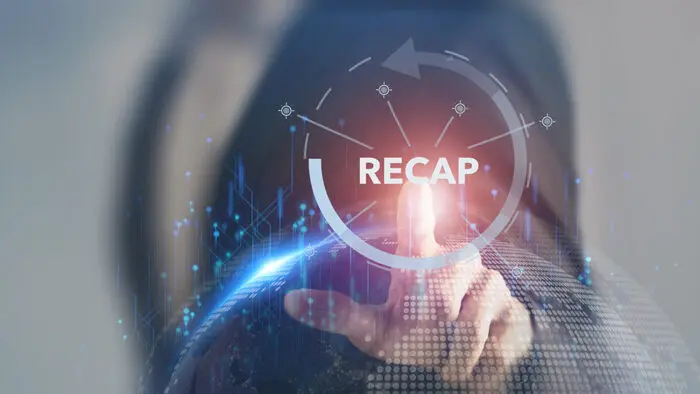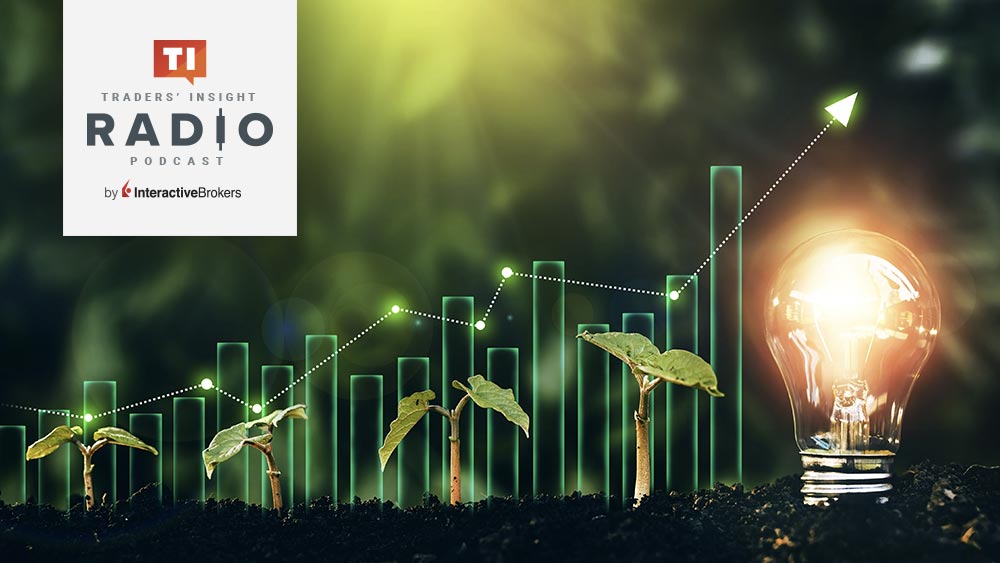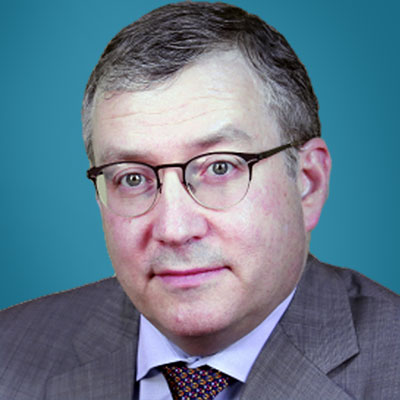Emmet Peppers, Chairman and Founder of Good Soil Asset Management, discusses his search for transformative technology stocks and his high risk/reward investment strategies with Steve Sosnick, Chief Strategist at Interactive Brokers.
Options involve risk and are not suitable for all investors. For more information read the Characteristics and Risks of Standardized Options, also known as the options disclosure document (ODD). To receive a copy of the ODD call 312-542-6901 or copy and paste this link into your browser:
http://www.optionsclearing.com/about/publications/character-risks.jsp
Summary – Traders’ Insight Radio Ep. 16: A Business with a Lower Success Rate Than the Restaurant Industry
The following is a summary of a live audio recording and may contain errors in spelling or grammar. Although IBKR has edited for clarity no material changes have been made.
Steve Sosnick
Hi everybody, welcome to Interactive Brokers Traders’ Insight Radio. I’m Steve Sosnick, Chief Strategist here at Interactive Brokers. My guest today is Emmet Peppers, Chairman and Co-founder of Good Soil Investment Management, an investment firm out on the West Coast. He also used to be a colleague of mine here at Interactive Brokers, working as a sales representative before moving onto, I’m going to say greener pastures, as it were.
We’re going to catch up a little bit, and we hope you all can learn something from his path and from his investment philosophy. Emmet, why don’t you introduce yourself to the audience, please?
Emmet Peppers
Thanks Steve, and you say, greener pastures I would say that I was very happy working at Interactive Brokers for the 12 or 13 years. That felt like green pastures to me compared to previous roles in finance. It’s an incredible company. I was so grateful that I had the opportunity to work there and in sales and learned so much working with hedge fund managers. Brilliant folks, many much smarter than myself, from rocket scientists to neuroscientists to mathematicians, starting hedge funds for former executive partners at prestigious financial firms leaving to start their own fund. You know, these people are so brilliant and they’re starting their own funds. I’m blessed to be able to be kind of their entrance into setting up their fund with Interactive Brokers and hear a little bit about their strategies and such.
So, I really learned a lot of different varieties of investment philosophies I would stay, in that role in sales for about 10 years and it was really a great experience for me.
Now here I am on the other side, I’ve done quite well on my personal trading account where I was able to launch my own fund and that’s where I’m at now, just one or two years in the making and we’ll see how it goes.
Steve Sosnick
One of the important things that you mentioned there is you covered a lot of hedge funds, a wide range of them, and especially being based out of San Francisco, you got a different flavor than some of the East Coast folks did, because I think there’s a more technological sensibility to a lot of those funds and fund managers.
Tell me some of the best things you took away from them?
Emmet Peppers
Yeah so, the first half of my career at Interactive Brokers I was actually on the East Coast and the headquarters there, but then the second half I did transfer to the West Coast and got exposure on both sides or both investment philosophies and mindsets and yeah, I took away a lot of interesting things.
One of the most important lessons I tell people that I’ve learned is no matter how bright these people are and how smart and intelligent they are, it’s sort of like when you’re young and you learn that Santa Claus isn’t real. Most hedge fund managers do not succeed for more than a year or two. It’s sort of a lower success rate than the restaurant industry I would say. It’s very hard to beat the market. No matter how bright someone is, no matter how much they back test some quantitative strategy or whatnot, it’s sort of a tough lesson that no matter what someone’s ideas are it’s probably better just to invest in the index. And that’s why I always tell friends and family. And so that was a tough pill to swallow.
But over the years I also realized that there are a few outliers that maybe I can learn lessons from and try to apply myself. And one or two of those lessons, for example, is kind of an extreme, as you know there’s one client I once had. Early on his fund went up like 10X in value in like a year. And I was like wow, how did that happen? You’d talk to the fund manager, and he explained his philosophy a little bit on what he’s doing. At the time Apple was really ripping. He was focused on Apple, and he was invested in some options and Apple stock and Apple supplier stocks. And options, very risky obviously, but you can really exacerbate your returns with that. So, I kind of took that filed that away in my head and I was like wow, that was interesting.
Then at the other end of the spectrum there are some clients that seem to do very well more consistently and a lot of times I’d learn more about their strategy to be very boring and just be buy-and-hold on a few key stocks and just hold it for years and never make a trade. Never generating commission revenue at Interactive Brokers, but you’d see their account value rise 3X or 5X over 5 or 10 years. Like, “wow, that’s really good. I guess they’re doing well then.” It’s kind of boring, but for my own philosophy I’m trying to take lessons from different things. If I felt like I found a company that I thought could be generational, like Tesla, which is one of my biggest conviction name, and you can combine that with options in an important way, then maybe you can do well. And so, I’ve done that a couple times with a few names and a few things and it’s worked out well for me.
Steve Sosnick
One of the takeaways there that I think people will find fascinating is that failure rate among hedge funds. I think people among the general population equate hedge fund managers with wealth — and for good reason because the most successful ones are deservedly so very wealthy. But I think they don’t realize the failure rate. Was there a correlation between intelligence and failure, or was there correlation between intelligence and willingness to learn from mistakes?
Emmet Peppers
I think the latter. Intelligence and humility are needed. Some people are too smart for their own good. That was my opinion, and maybe I’m too smart for my own good. Sometimes too, everyone has some of that in them, but the people that were able to recognize when they’re wrong, quicker or take constructive feedback or not be the alpha male so much. Those people seemed to have a better chance of success in my opinion after working with literally over 1,000 hedge fund managers over the 10+ years, I would say. I didn’t get to know all of them very well, but I got to know many of them well enough to understand their personalities and their philosophies to some degree. So, my takeaway is that humility is probably the most important trait, I would say.
Steve Sosnick
I’ve always found from the trading point of view that the best traders are the ones who let their let their winners ride and keep their losses small, and the only way you do the latter is by having some humility and discipline and just saying, “You know what, I thought I was right. For whatever reason I’m not. Let me figure out why I’m not, but in the meantime, let me not lose more money in the process and let’s move on to the next thing.” I’m glad you see that because I think that’s something very important for people to take away.
There’s one thing very unique about the way your fund is structured. I won’t even say what it is. Why don’t you explain it?
Emmet Peppers
My personal account profited wildly from the COVID crash. I was hedged with put options at the time, and it didn’t feel good making money when you weren’t sure what was going on with the world. I’ll tell you that it felt very tough. On one hand, yeah, my Portfolio is doing well and surviving and doing well, but the world is crashing maybe. And who knows how much of the population this virus could destroy or kill? We didn’t really know back in early 2020, and so I really had to do a deep dive on myself. Has my net worth jumped to an order of magnitude or two where now I had more money for myself and my family than I needed?
In the past I had an idea of getting to a certain level, and starting a hedge fund, ’cause that’s what I was servicing. I wanted to start a hedge fund to make more money, but now my net worth jumped like two levels, and it was, “well, I don’t really need to start a hedge fund to make more money. I have enough money for myself and my family. What can I do?” I had to really do some deep digging. I was doing a men’s Bible study for my church, and we were looking at one of the passages. It was the parable of the Sower and part of it just struck me one night. And it was like the seed that falls on the good soil has 30, 50 or 100 times return. I went, “Wow, that’s like my investment strategy or my investment performance in certain years. It has these wild returns I had in like 2013, 1014 and again in 2020.” That just hit me, and I thought, “what if I do have some unique skill, God given, to generate incredible returns from time to time?” Maybe I don’t, but maybe I do. I don’t know. But instead of just using it to further my own personal family wealth, I should do something good with it. And the idea of giving back to charity also came to mind, ’cause I’ve always been concerned about capitalism being under fire from socialism. I thought, “maybe I can help change the perception of capitalism and set up a fund where I write in the prospectus that half of the management fees and half the performance fees, net of expenses, goes back to charity. I’d write it as a law in the prospectus to try to be a good example to evolve capitalism.” and yeah, that’s what we’ve done, my partner Matt and I.
That’s what really wakes us up and keeps us going, more than just making money for ourselves and investors. We want to succeed in order to be a good example for stewarding capitalism and evolving it to where it’s more acceptable to the younger generation and not seeing hedge fund managers being the greediest of greedy pigs and trying to vote in Bernie Sanders or whatnot. I don’t want to get political, but there needs to be a change. I feel like one of the biggest threats to our civilization is diverting away from capitalism too much when you can just evolve it to maybe help make the most successful capitalist people be more focused on giving back so there’s a better perception of how successful capitalism can really be for everyone.
Steve Sosnick
Well, I don’t think that having a having a conscience or social mindset is incompatible with capitalism. I think what you’re doing is one way to recognize that and I think you should be applauded for that, rightfully so.
Let’s take it a little bit further: you acknowledge that you’ve had tremendous success and to keep the compliance people happy, let’s not talk absolute returns because that gets us into trouble. You’ve had very good success taking risk. How do you mitigate risks on behalf of your customers?
Emmet Peppers
Yeah, that’s a great question, so there’s a couple things. First, for myself and for many of our investors or customers who are giving us some of their wealth to manage, we make sure it’s no more than 10% of someone’s net worth that they’re investing because it’s very risky. It goes up or down 10% a day, or 50%+ a month sometimes. The fund is meant to be the risky portion of someone’s wealth, and so for those that follow me on social media, I’ve advocated many times that hey, with this type of investing style with options maybe only use a small basket of your savings that you set aside for this only and make sure it doesn’t interfere with your retirement savings and keep that pool of money separate. I think that it’s not a bad idea to experiment. Almost like when you go to the casino, you might go and say, “I’m going to bring 1,000 bucks to the casino that I’m willing to lose on blackjack and other things, but maybe I’ll do well, who knows?” So it’s sort of like that. But you know you’re not going to go with more than $1000 into the casino.
That’s sort of how I think about the risk of the fund in some ways, but on another side of the risk is that the Interactive Brokers’ technologies is incredible, and it helps us analyze our risk using a number of the tools. The real-time margin calculations with Interactive Brokers are great because we can see how close we are to using all our excess liquidity, or if we’re getting close to a margin deficit, we can see tick by tick with the market. Like, “alright, its time, we need to close a few positions before we get into a margin deficit” or whatnot. And there’s lots of tools that we use that are very helpful. I can go into more detail later too.
Steve Sosnick
You might as well go into it now. There’s no time like the present. Please ’cause I think I think some of the listeners would benefit from hearing the real-world application of a lot of the tools that are on the platform.
Emmet Peppers
Yeah, I mean I’ve had the benefit of working at Interactive Brokers for 13 years prior to this, so I have a lot of experience using the technology and such. But there’s still a lot of the technology I don’t use, or I don’t fully understand. There’s just a breadth of tools. A couple of tools I really like is for our investment philosophy. For example, I really like the Options Probability Lab because a lot of our investment philosophy is trying to look for asymmetric return opportunities where it’s sort of like maybe a binary outcome on a stock. Like, five years ago you could view Tesla as a binary outcome stock as though it’s either going to go bankrupt or it’s going to be wildly successful and be 10 times bigger than it was. And so, if you used the options for like 2 years out, or LEAPS options, long term options for that time, you could look at the Probability Lab on Interactive Brokers and say, “what is the options market putting in for a percentage chance of a double in this price in the next one or two years?” And you’d say, “oh, it’s only like a 20% chance according to this, so it’s a steal for me. I’m going to buy it.” A lot of times those options turned into zero because Tesla stock for example, was very range bound from 2013 to 2019 between, like a $200 and $300 range pre-split and so I lost that, but I’ve made sure I survived enough to keep doing it over and over. And sure enough, in 2019 it exploded and took off.
There are other stocks that you may be able to identify that you think are binary. Another name we talk about is Lemonade. It’s like an insurance tech play. It has a tiny market cap right now, but if it disrupts the insurance industry the total addressable market is huge. So that’s another kind of binary outcome and maybe you think there’s only a 20% chance that that happens, but if that 20% chance happens, maybe you project, oh, it’ll be a 10 times bigger stock in two or four years. If you look at the options probability lab and could say, “oh markets are only pricing it to double in two years at a 5% chance.”
So those are the types of investment decisions that help inform me on the Probability Lab. You can do it for a shorter term thing, like whether you think the S&P inclusion of a stock is going to make it hit higher levels than it normally would otherwise for example.
There’s also the Risk Navigator, which is a tremendous tool for risk and analyzing your portfolio. I use the risk navigator frequently because if I’m looking at the Probability Lab and picking some options I’m thinking of, then I can use the risk navigator to put in a custom scenario. You can customize a hypothetical portfolio and say, “OK, if I put these options contracts in a hypothetical portfolio and then I customize it to be six months later, and the price of the underlying goes up 20%. What are those options worth at that time?”
People have spreadsheets that do something similar. You can create that spreadsheet, but it’s very manual to do that. Risk Navigator is just kind of plug and play. If you know where to click, it’s very efficient to use. It’s very helpful to inform me. Then you also have delta dollars that the Risk Navigator shows as part of that. You can also pull up a column in your Trader Workstation that shows your delta dollar exposure, which is easy versus looking at third party reports to reference all the time. I just love the technology. You know, it sounds like I’m a commercial.
Steve Sosnick
In some ways we could argue that you may be the more effective salesman now that you’re not here because you’re using it in action. You’ve alluded to a couple of things that I find fascinating. I’ve yet to find anyone who uses all the tools. It’s impossible and we know it, and you’ve known it for years. But the point is, it’s meant to be something usable for all different people. You’re not going to use some of the fixed income tools, ’cause that’s not what you do. On the other hand, you know Risk Navigator has applications to everyone. Probability Lab is very options specific. I use it all the time. I’ve used it in several pieces that I write around earnings because it’s what the markets telling you the most likely outcomes are. For those of you who’ve never used the probability lab or who aren’t familiar with it, basically what it’s doing is taking the area under the curve so to speak, as you price out options. There’s a range of probability from zero to 100, and so any outcome within the strike space has some probability. The question is, depending on the implied volatility of those options, vis-a-vis the strike space, there’s an implication as to whether the market is viewing things favorably or unfavorably. See whether the tails are fat or thin, so to speak. I’ll use it a lot of times to say there’s this hump in the curve 5 or 10% above the market. Traders are bullish or vice versa, there’s a hump 5 or 10% below the market, so the highest probability is for a downward outcome. The way you expressed it was OK. Versus the market you have a very different probability of a true upside surprise. Well, it’s not surprising to you, but surprising to the market, for a true upside event that the market is underpricing.
I find it a very powerful tool as well, and it’s interesting that we use it in largely different ways. You’re looking at LEAPS and I’m using it to help to help our customers understand how an event might be interpreted by the market two days from now.
Emmet Peppers
Sometimes I use it for smaller duration options as well. A good analogy I like to explain to people is that in the past I used to be a big bettor on sports like NFL football games. And I was a huge New York Giants fan. I’d follow all the NFL teams fantasy football. I felt like I knew the sport very well. Sometimes in the games or every week, I would bet some amount of money, and before I would make my bets, if I was following the Giants and they were playing the Eagles in Philadelphia, I would do my own math. Do I think the Giants or should be favored by three points here, and then I would look at the Vegas odds. If the Vegas odds makers showed Philadelphia favored by three points, I’d be like, “Oh, this is a win. I’m gonna just bet the money line for the Giants to win”, and then I’d put the money down. That’s how I would place my bets with the things that I felt were mispriced in the market of Vegas odds makers. It’s similar to options. If you think you know a stock, whether it’s Interactive Brokers or some other stock or the index? Like S&P 500 is gonna go up 10% between now and the end of the year. Then you can look at the Probability Lab and say, “where are the odds makers? What’s the market pricing that percentage move to be?” If you think it’s mispriced versus what your intuition is saying, then why not take a little bit of a risk, or gamble with that portion of money that you’d be more risky with to see if you’re right or not. You can calibrate your own instincts over time based on feedback of your performance.
Steve Sosnick
So, getting a bit more high-level in your thinking here, you tend to be looking for companies that you believe are transformative. How often do you see those coming around?
Emmet Peppers
I mean, there’s so many companies I can’t study them all. I get pitched so many ideas. Now I’m sort of like a mini celebrity in the Tesla Twitter-verse or whatever, and there’s so many other stocks people are trying to pitch you and tell you to look at and advocate for. And obviously, my partner Matt and I have limited bandwidth of time to really research companies and industries. There’s lots of stocks we research a bit and we’re like, “yeah, this could be a good investment, but we don’t really understand the industry well enough to really know.” Or, “we think it could do well, but it’s not going to.” The market cap isn’t going to go up five times from where it is now. You have to look at the total addressable market.
Everyone knows who SpaceX is, right? It’s valued in the private markets at around $100 billion, right? And then you had these space SPACS kind of come about. They kind of went crazy along with all the other SPACS, but Rocket Lab, we felt, was one of the only companies that had legitimate technology going to lower Earth orbit. None of the other space companies knew how to get to lower Earth orbit except for Rocket Lab and we researched the industry as sort of a byproduct of being fascinated with SpaceX, being a huge Elon and Tesla fan. Then we came to the conclusion that Rocket Lab is a legitimate second place to SpaceX in this space. We’re not seeing it ever gonna overtake SpaceX, but if the 1st place to the space industry is SpaceX at 100 billion plus market cap, what should the 2nd place to be valued at? And currently it was like a $4 or $5 billion market cap when we first started investing and so we thought that was good and we’ve since analyzed the total addressable market. It’s really growing and evolving fast over this decade we think. And we talked to a number of industry experts to further our conviction so we really dive as deep as we can into the industry and the competitors and try to figure out. We’re always looking for ways to falsify our thesis. And you know, sometimes we do.
There are other stocks like Square. Now it’s called Block. We were a big investor in Square early on and it did very well. At a certain point, even though we still liked it, we just thought the further upside was nothing and we closed out, luckily near the highs.
Those are trades we did well, and we’ve also failed on trades. We’ve tried to buy puts on Nikola multiple times, and they’ve been very expensive, and we mistimed it and lost on that.
Sometimes we were right, but the duration of the options was wrong.
Steve Sosnick
Every options trader has his stories of being too early in the thesis. I could go back over several plenty of occasions of…
Emmet Peppers
Yeah, you remember all those, right? Yeah, it’s funny.
Steve Sosnick
Bought a put or a call and watched it expire and then two, three days later the event happened or whatever. But that’s how you have to learn, and you have to be cognizant of this.
We have used a lot of the time available to us.
I guess the final comment would be since you mentioned how you manage the risks, you don’t want to take too much of an individual, customers, money, etc., vis-a-vis his net assets. Besides using risk manager, how do you ensure that the risks that you take don’t come back and bite you? Drawdowns can be a killer. How do you mitigate that?
Emmet Peppers
Yeah, it’s a great question and you know, we’re focused on disruptive tech growth stocks as you note. As we alluded to earlier and in the early part of 2022, it’s been a really hard time for us, and we had some really painful days and experienced some of that firsthand. Luckily, we do have some short positions on stocks that we think are more story stocks. We also hedge occasionally with index puts if we think there’s a macroeconomic risk, you know at the start of the Russia-Ukraine invasion. There was just a lot of uncertainty and we bought some medium-term and short-term puts. They were very expensive, but we’ve lost on some and we closed them out later for sort of even money after the market had gone down because they were expensive, and they were kind of shorter duration out of the money.
But we just don’t know like there’s certain uncertainties out there. Geopolitical events, like is a nuclear tactical nuclear weapon going to go off? Who knows, and that it would be horrible for the world. But we have to protect our portfolios as well to some degree, and so most likely it’s not going to happen. But in the 1% chance or 5% chance it happens, we want to be sort of ready for the worst-case scenarios if we can.
Steve Sosnick
Ah, thank you, we’ve covered a lot of ground. I’m going to leave it here. I really appreciated our conversation. I urge our listeners if you’ve liked it, find and follow us on social media. He’s quite visible and I can’t specifically say look for his fund because it’s a hedge fund and so there are rules against me saying that sort of thing.
Any final thoughts?
Emmet Peppers
Yeah, I mean folks can go to our website, goodsoilinvestment.com. We are technically a 506 C fund, which means we can market our performance to the public, but just go to our website if you’re interested in looking at that.
Maybe I’ll be one of the restaurants that fails miserably. Or maybe we’ll be one that succeeds and can set a good example to have more fund managers maybe apportion some of their fees to charity too in the future.
Steve Sosnick
That would be wonderful.
Thanks everybody for listening again. I’ve been talking with Emmet Peppers Chairman and founder of Good Soil Investment Management, and you’ve been listening to Interactive Brokers Traders’ Insight radio. I hope you enjoyed this, and we look forward to having you tune in again soon. Thanks everybody.
Emmet Peppers
Thanks, Steve.
Disclosure: Interactive Brokers
The analysis in this material is provided for information only and is not and should not be construed as an offer to sell or the solicitation of an offer to buy any security. To the extent that this material discusses general market activity, industry or sector trends or other broad-based economic or political conditions, it should not be construed as research or investment advice. To the extent that it includes references to specific securities, commodities, currencies, or other instruments, those references do not constitute a recommendation by IBKR to buy, sell or hold such investments. This material does not and is not intended to take into account the particular financial conditions, investment objectives or requirements of individual customers. Before acting on this material, you should consider whether it is suitable for your particular circumstances and, as necessary, seek professional advice.
The views and opinions expressed herein are those of the author and do not necessarily reflect the views of Interactive Brokers, its affiliates, or its employees.
Disclosure: Risk Navigator
The projections or other information generated by the Risk Navigator tool regarding the likelihood of various investment outcomes are hypothetical in nature, do not reflect actual investment results and are not guarantees of future results. Please note that results may vary with use of the tool over time.
Disclosure: Probability Lab
The projections or other information generated by the Probability Lab tool regarding the likelihood of various investment outcomes are hypothetical in nature, do not reflect actual investment results and are not guarantees of future results. Please note that results may vary with use of the tool over time.
Disclosure: Testimonials
Please note that the testimonial provided in this interview does not reflect the experience of all users of the Probability Lab and Risk Navigator tool. In addition, this testimonial is not to be misconstrued as any guarantee or promise of future performance or success through use of the Probability Lab or Risk Navigator tool.
Disclosure: Hedge Funds
Hedge Funds are highly speculative, and investors may lose their entire investment.
Disclosure: Margin Trading
Trading on margin is only for sophisticated investors with high risk tolerance. You may lose more than your initial investment. For additional information regarding margin loan rates, see ibkr.com/interest
Disclosure: Options Trading
Options involve risk and are not suitable for all investors. Multiple leg strategies, including spreads, will incur multiple commission charges. For more information read the "Characteristics and Risks of Standardized Options" also known as the options disclosure document (ODD) or visit ibkr.com/occ





